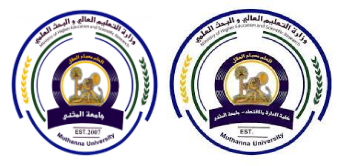The role of training in sustainable quality management: an analytical study in the police martyrs press in the iraqi ministry of interior.
- Post by: Muthanna mjdes
- September 12, 2023
- Comments off
Osama Ahmed Hjael & Aseel Ali Mezher
University of Al-Qadisiyah / College of Administration and Economics / Business Administration Department
University of Al-Qadisiyah / College of Administration and Economics / Business Administration Department
Abstract
The main objective of this study is to highlight the impact of training programs in sustainable quality management. The sample of this study was represented by workers in the Investment Police Martyrs Press affiliated with the Iraqi Ministry of Interior. Moreover, the number of workers (between officers, employees, policemen, and contract workers) is 170. The study problem and objectives were formulated according to the study variables, and its hypotheses were formulated according to the study variables. To analyze the study data, the questionnaire was adopted to analyze the workers’ answers, as it consisted of (41) questions distributed over the dimensions of the study variables. The percentage of valid questionnaires was for analysis (92%). However, the number of valid questionnaires was (156) out of (170) distributed questionnaires. This work relied on testing the hypotheses of the correlation and influence between the independent variable (TRAI)) and the dependent variable (Sustainable Quality Management (SUQM)) by three dimensions (quality costs, social quality, and concern for the environment). The statistical package of (SPSS.V.28) software has been utilized to measure the simple correlation hypothesis (Pearson), and the statistical package of (AMOS.V.26) software to measure structural equation modelling And especially in the influence hypothesis of (n = 156). The study reached a set of conclusions, most notably a direct and indirect correlation and influence between the study variables (training, sustainable quality management). Based on the data obtained from the study sample’s responses, it was concluded that training plays a crucial role in both employee development and task performance, as training is an important factor in enabling employees to achieve the organization’s aspirations to reach sustainability in all areas of work, which training is considered one of Its most important pillars.
Volume 13, Issue 2, Pages 1-14
DOI: 10.52113/6/2023-13-2/1-14
